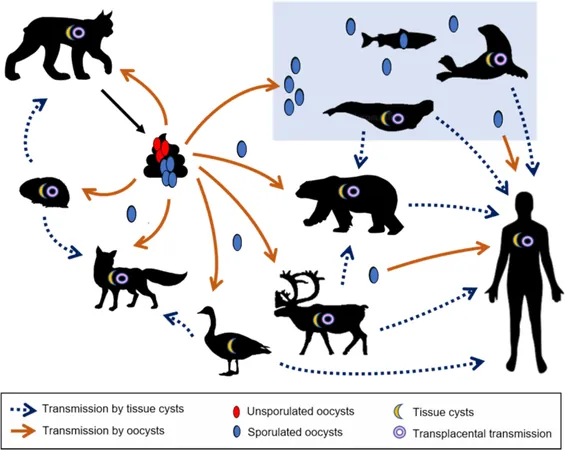
Alarm Bells Ring: Climate Change Unleashes Ancient Diseases as Arctic Warming Accelerates
2025-04-07
Author: Siti
Introduction
As temperatures soar in the Arctic due to climate change, a consortium of international scientists warns that this phenomenon is paving the way for the rise of infectious diseases, including brucellosis, tularemia, and E. coli. According to a pivotal study published in the journal Science of the Total Environment, melting ice is not just a result of warming; it’s a catalyst for a public health crisis that we can no longer afford to ignore.
The Danger of Thawing Permafrost
The researchers emphasize that the thawing of permafrost, which has been frozen for millennia, may release ancient, dormant microbes locked in the remains of dead animals. These once-locked pathogens could potentially pose a pandemic threat, prompting fears that they could jump from wildlife to humans. "The thawing permafrost is a game changer. It could unleash bacteria or viruses long thought extinct,” warns Dr. Khaled Megahed Abass of the University of Sharjah, a key contributor to the research.
Zoonotic Diseases and Climate Change
As the Arctic becomes increasingly accessible to industries and tourism, the risk of zoonotic diseases—pathogens that are capable of transferring between animals and humans—grows. The study underscores how climate change and pollution are intertwined forces that threaten not only animal health but human wellbeing, reflecting the urgent need to address environmental stressors in Arctic ecosystems.
A One Health Approach
Notably, the research adopts a "One Health" approach, emphasizing the interconnectedness of human, animal, and environmental health. The findings indicate that approximately three-quarters of all known human infectious diseases are zoonotic, and as pollution and climate change escalate, so too does the transmission of these diseases. The authors advocate for heightened awareness and better management strategies for emerging infections in the Arctic region to prevent extensive outbreaks.
The Importance of Indigenous Knowledge
As scientists examine the transformations occurring in this fragile region, they've noted that traditional knowledge from indigenous communities could be invaluable in detecting early signs of ecological and health changes. "What happens in the Arctic doesn't stay in the Arctic; its effects ripple across the globe," cautions Dr. Abass.
Call to Action
This groundbreaking study serves as a clarion call to governments, public health organizations, and industries, urging them to proactively monitor health risks linked to rapidly changing Arctic conditions. By prioritizing robust disease surveillance, comprehensive environmental monitoring, and enhancing public health systems resilient to climate change, we can better prepare for future threats.
International Collaboration Needed
The findings also indicate a pressing need for international collaboration and transdisciplinary research as global agencies unite against the escalating crisis. Failure to address these issues may have catastrophic impacts not just for those living in Arctic regions, but for the entire world, making it imperative that we act swiftly and decisively to mitigate the inevitable consequences of climate change.



 Brasil (PT)
Brasil (PT)
 Canada (EN)
Canada (EN)
 Chile (ES)
Chile (ES)
 Česko (CS)
Česko (CS)
 대한민국 (KO)
대한민국 (KO)
 España (ES)
España (ES)
 France (FR)
France (FR)
 Hong Kong (EN)
Hong Kong (EN)
 Italia (IT)
Italia (IT)
 日本 (JA)
日本 (JA)
 Magyarország (HU)
Magyarország (HU)
 Norge (NO)
Norge (NO)
 Polska (PL)
Polska (PL)
 Schweiz (DE)
Schweiz (DE)
 Singapore (EN)
Singapore (EN)
 Sverige (SV)
Sverige (SV)
 Suomi (FI)
Suomi (FI)
 Türkiye (TR)
Türkiye (TR)
 الإمارات العربية المتحدة (AR)
الإمارات العربية المتحدة (AR)